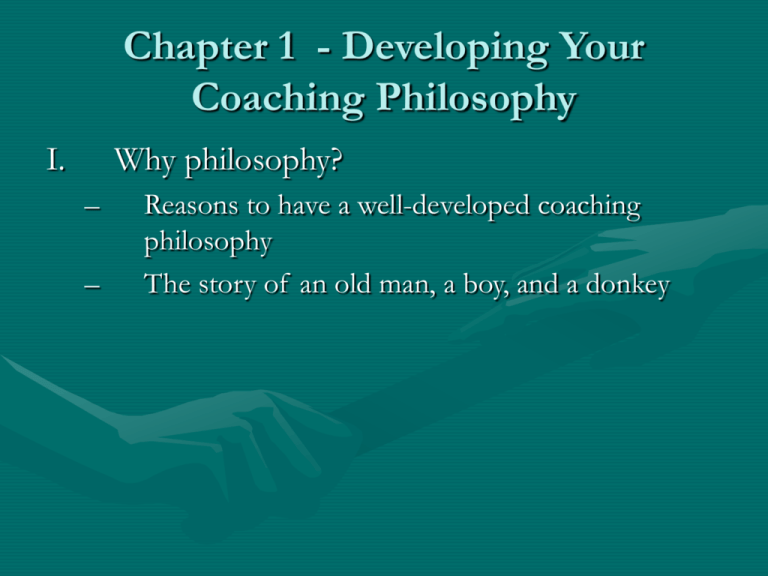Chapter 1 - Developing Your Coaching Philosophy
advertisement

Chapter 1 - Developing Your Coaching Philosophy I. Why philosophy? – – Reasons to have a well-developed coaching philosophy The story of an old man, a boy, and a donkey II. Developing your philosophy • Components of a philosophy – Major objectives – Your beliefs or principles that help you achieve your objectives • How life events can affect your coaching philosophy (see figure 1.1, p. 6) • John Wooden’s philosophy of coaching: emphasis on teaching and performing • How your philosophy of life should shape your philosophy of coaching III. Self-Awareness A. Knowing who you are in order to help your athletes know who they are B. Why your athletes are much more likely to become what you are than what you want them to be C. Ways to increase self-awareness – Reflecting on your own beliefs and assumptions – Requesting feedback from other people on how they see you and how they react to you – “Who Am I?” questions for thought and reflection on p. 9 D. The three selves - The ideal self - The public self - The real self E. Knowing your three selves (see table 1.1, p. 11) - Rate yourself and review - Remembering that others only know your public self IV. Self-Esteem • Your inner conviction about your competency and worth as a human being • Consequences of basing your self-esteem on winning and losing • Using confidence to develop confidence in those around you • The effect of how we relate to ourselves on how we relate to others V. Self-Disclosure • The significance of self-disclosure – What Olympic basketball coach Tara VanDerveer learned from assistants – Athletic director and football coach Jim Bouche’s philosophy • Keeping self-disclosure relevant to your relationship and appropriate to the situation VI. Conclusion • Philosophy is a key to pursuing your career as a coach. • Learn about yourself and think about important issues to guide your actions. • Appropriate self-disclosure to athletes helps establish trusting relationships. • Sharing your philosophy helps athletes develop their own philosophies. • The most important ingredient of a philosophy is that you own it. • A philosophy is not expressed by what you say, but by what you do Conclusion - continued • Sharing your philosophy helps athletes develop their own philosophies. • The most important ingredient of a philosophy is that you own it. • A philosophy is not expressed by what you say, but by what you do.








